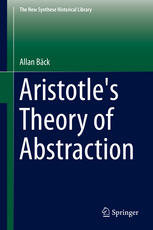

Most ebook files are in PDF format, so you can easily read them using various software such as Foxit Reader or directly on the Google Chrome browser.
Some ebook files are released by publishers in other formats such as .awz, .mobi, .epub, .fb2, etc. You may need to install specific software to read these formats on mobile/PC, such as Calibre.
Please read the tutorial at this link: https://ebookbell.com/faq
We offer FREE conversion to the popular formats you request; however, this may take some time. Therefore, right after payment, please email us, and we will try to provide the service as quickly as possible.
For some exceptional file formats or broken links (if any), please refrain from opening any disputes. Instead, email us first, and we will try to assist within a maximum of 6 hours.
EbookBell Team

5.0
78 reviewsThis book investigates Aristotle’s views on abstraction and explores how he uses it. In this work, the author follows Aristotle in focusing on the scientific detail first and then approaches the metaphysical claims, and so creates a reconstructed theory that explains many puzzles of Aristotle’s thought. Understanding the details of his theory of relations and abstraction further illuminates his theory of universals.
Some of the features of Aristotle’s theory of abstraction developed in this book include: abstraction is a relation; perception and knowledge are types of abstraction; the objects generated by abstractions are relata which can serve as subjects in their own right, whereupon they can appear as items in other categories. The author goes on to look at how Aristotle distinguishes the concrete from the abstract paronym, how induction is a type of abstraction which typically moves from the perceived individuals to universals and how Aristotle’s metaphysical vocabulary is "relational.’
Beyond those features, this work also looks at how of universals, accidents, forms, causes and potentialities have being only as abstract aspects of individual substances. An individual substance is identical to its essence; the essence has universal features but is the singularity making the individual substance what it is. These theories are expounded within this book. One main attraction in working out the details of Aristotle’s views on abstraction lies in understanding his metaphysics of universals as abstract objects.
This work reclaims past ground as the main philosophical tradition of abstraction has been ignored in recent times. It gives a modern version of the medieval doctrine of the threefold distinction of essence, made famous by the Islamic philosopher, Avicenna.